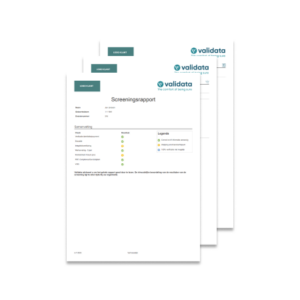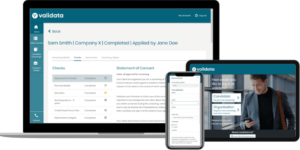
Can you do in-employment screening on existing employees?
A background check is usually carried out before the start of employment, but in-employment screening can be carried out on existing employees if there is a clear purpose for the check. In this case of in-employments screening, running the background check can be done when lawfully based on the legitimate interest under GDPR.
A legitimate interest could be, for example, that there are internal regulatory requirements within the industry or that an employee will be promoted to a role with more responsibility, specifically as the company’s chief financial officer or a higher executive role. You need to clearly communicate the purpose and be transparent with the employee about why and how the in-employment screening will be carried out.
Most importantly, you will ensure that the reputation of the organisation is not damaged by potential criminal acts. A safe and secure workplace starts with the staff – start with a thorough in-employment screening today.
In-employment screening is a necessity
There are currently misconceptions about screening performed during recruitment and hiring. Screening can be seen as an intrusion into one’s private life. For many employers, in-employment screening is seen as part of the organisation’s risk management and to ensure a safe and secure workplace. Several companies in different types of industries have chosen to carry out in-employment screening and requesting criminal records from job applicants. This includes postmen, nurses, social educators, support assistants, personal assistants and others.
According to the Swedish Public Employment Service’s (Arbetsförmedlingen) analysis, economic crime and undue influence in Sweden has increased significantly in recent years. You might wonder, what does undue influence include? It includes everything from corruption, infiltration, bribery and harassment. When it comes to security classified occupations e.g., within the government, banking and finance, telecommunication, energy and water supply, transport and financial services.
Introducing in-employment screening is therefore a necessity rather than an option in the recruitment process.
Source: Arbetsförmedlingen (The Swedish Public Employment Service’s. Please note, the source is in Swedish.)

Why do you need to continuously conduct in-employment screening?
In-employment screening should be considered a continuous process rather than one isolated event. Employees’ circumstances and backgrounds can change over time and it is therefore important to regularly update and review the information. By continuously conducting in-employment screening, you can ensure that your employees still fulfil the requirements and expectations placed on them. This helps to maintain a safe and reliable working environment.
Check of financial crime
For companies in the banking and financial sector, continuous in-employment screening is particularly important for financial risk assessment. If a financial officer has committed financial offences such as accounting offences, tax offences or embezzlement, this is a reason to terminate their employment to protect the business.
Checking for crimes that directly affect your business
In-employment screening is also important to find out if the employee has committed offences that directly affect the business. This could be, for example, offences related to work, staff or you as an employer. Even then, there may be grounds for dismissal to keep the workplace safe and secure.
Credit checks on employees
An in-employment screening can also reveal if an employee is invested in directly or indirectly competing activities. Employees have a duty of loyalty which means that they cannot have a second job that affects their current employment. Many companies also choose to establish a non-compete clause in their employment contracts which means that the employee is not allowed to hold a job at a competing business. Our background check includes a credit check which can help you make sure that the employee has no other income.
What kind of information is seen in a credit check?
In a credit check, you as an employer have the opportunity to see basic information such as social security number, name, gender and age, marital status, registered address, income in the last 3 years and payment remarks.
Validata’s in-employment screening includes credit checks on staff, which will give recruiters and HR departments an insight into potential risks among workers in difficult financial situations. A screening report can also show debt balances with Kronofogden, debt balance history, foreclosure attempts and foreclosures, business engagements, property information and credit ratings. With this information, you can build a reliable workforce in the workplace.
Do you have questions or concerns? Contact us or see more of our control profiles and prices.
How often should you do in-employment screening on your employees?
The frequency of in-employment screening varies, depending on the organisation and industry, among other things. In general, it is recommended to conduct regular in-employment screening, especially for employees with higher responsibilities or for job roles where security is crucial. Develop a company policy specifying the frequency of in-employment screening. We recommend conducting in-employment screening once every three or five years.
How to conduct in-employment screening?
When conducting in-employment screening, it is important to follow ethical guidelines and respect the privacy of employees. It is beneficial to have clear guidelines and rules for conducting such checks, and you must inform employees of the upcoming in-employment screening. Having a clear screening policy in place helps to run an effective screening programme, this can also be used to inform employees. Hiring a professional screening provider can be wise to ensure that the process is carried out correctly and that relevant information is collected in an ethical and legal manner.
At Validata, we help you to have a smooth and secure verification process. Register your employees in our secure software and choose which parts you want to check. We process all the data and you get a digital report where you can easily see if there are any deviations. You can rest assure that all current laws and regulations such as GDPR are complied with, and our dedicated support team is available for you if you need help. We can also help you communicate with your employees to make sure they feel completely comfortable with the process.
Get a customised solution for background checks – Contact our team.


Do you want quick help? Fill in the form below, and our team will contact you shortly!
Contact us
Contact us
"*" indicates required fields
Contact us
"*" indicates required fields
Download the white paper
Download the white paper
Download the white paper
Contact us
"*" indicates required fields
Thanks for registering!
"*" indicates required fields









